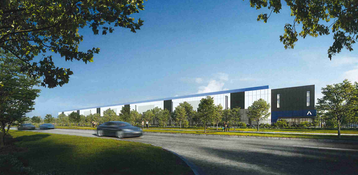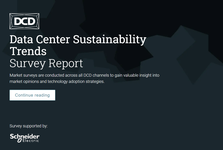Aligned Data Centers has asked Maryland's Public Service Commission to reconsider its decision to reject exemptions for diesels on the giant Quantum Loophole campus.
The data center developer says the commission "made factual and legal errors" when it rejected an exemption from state emissions laws for 168 diesel generators on a development at Quantum Loophole’s planned data center campus in Frederick County. The ban is causing a delay to the first data center deployment on the site, which is planned as an overflow for the huge data center demand in neighboring Virginia.
The commission told the Frederick News-Post that it was considering the request, but did not give any timeline for its decision.
Under Marylands's environmental rules, new generating capacity has to be granted a "certificate of public convenience and necessity" (CPCN), but small diesel generators for emergency backup at data centers are normally granted an exemption, provided they operate within strict limits.
In the meeting which rejected the exemption, commissioners described the set of generators as a "500MW diesel power plant," and raised concerns about their emissions, suggesting that the company should adopt alternative low-carbon technologies. If the rejection stands, Aligned must go through the full process of applying for a CPCN, which will involve a public hearing and could take a year.
The site, a former smelting plant in Adamstown was bought by Quantum Loophole in 2021, for a reported $100 million, and proposed as an alternative site to the overcrowded hub at Ashburn, 25 miles away in Northern Virginia. Quantum Loophole plans to host hyperscale tenants on the 2,100-acre campus, which could use more than 1GW of power. Aligned was the first major data center builder to sign up for the campus in 2022 and announced a significant development with an initial capacity of 23.3 million sq ft and 264MW.
Maryland has offered tax incentives to bring data centers in. The Commission backed that decision but said the State had a responsibility to reduce emissions. Commissioner Bonnie Suchman said: "We think it's a good idea to bring data centers here. But that doesn't obviate the commitment that the state has also made to reducing greenhouse gases - and bringing in new diesel generators is going in the wrong direction."
Aligned has not told DCD what errors it found in the commission's decision, but a consultant engineer contacted DCD with one possible issue.
Suchman suggested to the Commission meeting that Aligned might use the generators in a non-emergency situation, saying: "I don't know how a company can say 'we will never be in a situation where we're looking at the price of power and we've made an economic decision that we're going to run these generators and use the system as backup.'"
In fact, the Maryland Code of Federal Regulations sets strict limits on non-emergency use: "Emergency stationary ICE [internal combustion engines] may be operated for up to 50 hr/yr in non-emergency situations, counted as part of the 100 hr/yr for maintenance and testing and emergency demand response. The 50 hr/yr for non-emergency situations cannot be used for peak shaving or non-emergency demand response, or to generate income for a facility to an electric grid or otherwise supply power as part of a financial arrangement with another entity" (Section 60.4211(f)(3) of Subpart IIII of Title 4), unless the generators are under external control, for instance by the local grid authorities, and are used to balance the grid.
"If Aligned Data Centers applied for permit applications for Emergency Generators, the referenced section would prevent Aligned from doing precisely what Suchman alleged that they could do," said Dan Welch, principle engineer at Aeolus Consultants, in an email to DCD. "Unless Aligned permitted the engines as prime engines and not emergency engines - which does not appear to be the case - Aligned would not be able to generate non-emergency prime power on their own initiative. Suchman's argument is a strawman."
DCD has asked for more information from Aligned.




